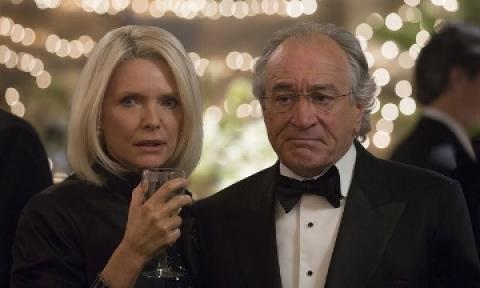Who needs The Wizard of Lies, a new made-for-TV drama about the wreckage left by Bernie Madoff’s devastating Ponzi scheme? Based on New York Times journalist Diane Henriques’s account of the Madoff affair, The Wizard of Lies is a toothless and psychologically simplistic tragedy about Bernie’s impact on his immediate family, particularly wife Ruth (Michelle Pfeiffer), and sons Mark and Andrew (Alessandro Nivola and Nathan Darrow). Madoff (Robert De Niro) is humanized in this context, since he’s portrayed as a clueless sociopath who does not understand the extent of the damage he’s caused, and only superficially empathizes with people he thinks he cares about.
Recent dramas like The Wolf of Wall Street, The Big Short, Gold, and even last year’s TV mini-series Madoff have also tried to make financial crimes more relatable. But The Wizard of Lies is offensively trite, despite strong performances from De Niro and Pfeiffer, and typically effective direction from Barry Levinson (Wag the Dog, Diner).
Madoff is presented, through a series of flashbacks, as a self-deluding monster. The first of half of his sprawling story is largely concerned with Madoff’s version of events after they occurred. He’s shell-shocked half the time, and accuses everyone but himself of being guilty. He says that the people he bilked are “greedy” and stammers when his sons refuse to support him. Madoff even bitterly complains that he’s done everything he could to protect his family by keeping them in the dark about the extent of his illegal activities.
That’s how this version of Bernie Madoff sleeps at night: he not only sees the people he cheated as inhuman cyphers, but fixates on the idea that he loves his family enough to ensure that their hands are clean. So we hear The Platters’ The Great Pretender playing at a fundraising dinner that Madoff micro-manages, I mean, presides over. And we watch as Bernie tries to force Mark to eat one of the lobsters that he personally insisted would be on dinner menu. Bernie may be a monster, but he’s ostensibly normal enough (in this moment) to look like a bougie fuddy-duddy.
The Wizard of Lies is not, in that sense, a woe-is-me drama, but rather a bathetic woe-is-they affair. Madoff left a smoking crater in his wake, but the only people whose lives appear substantially effected are the Madoffs. Ruth frantically makes countless phone calls to loved ones and family friends, but is endlessly deferred. She can’t even get her favorite hairstylist to make house calls because he’s afraid that his reputation will be tarnished. And Mark obsesses over blog comments from so-called experts who insist that he and Andrew were fully aware of his father’s fraud, and simply did nothing. According to Henriques, Madoff was turned in by his sons. But it’s a huge mistake to assume that Mark and Andrew are bigger dupes than Madoff’s backers just because they were betrayed by somebody they loved and trusted implicitly.
Where, then, are Madoff’s financially devastated investors? Their role in Levinson’s film is of tellingly minor importance, since they only have one emotional register – uninformed anger. There’s the bystanders and passersby who try to ambush and/or bully Madoff’s sons. These people scream and curse and fume about their money, their ruined lives, and their broken trust. They are impotent victims, as we see in an eyeroll-inducing dream sequence where Madoff imagines being being shot to death in his own home while paparazzi descend, and accusers’ eyes (filmed in surreal extreme close-up) glare at him. There’s also the courtroom defendants who shame Madoff by reading prepared statements that effectively blur together to form a single sentiment: you took advantage of me, and I hope you feel as badly as I do. Madoff lamely tries to apologize to these bystanders. But they cheer when he is sentenced to 150 years in prison.
It says a lot about The Wizard of Lies that, in this scene, Madoff’s pain seems more real than the emotions that motivate a mob to cry out for his blood. Levinson and his co-creators may have the best of intentions, but their plea for greater understanding will likely fall on deaf ears since they’ve only inadvertently confirmed Madoff’s self-pitying defense by portraying members of the working class as collateral damage in the Bernie Madoff story. We may be wrong to look for scapegoats for the 2008 global financial criss, but by normalizing Madoff’s behavior, The Wizard of Lies thoughtlessly asks us to sympathize with a devil we don’t want to know.
'The Wizard of Lies' premiered on HBO on 20 May.


Spread the word